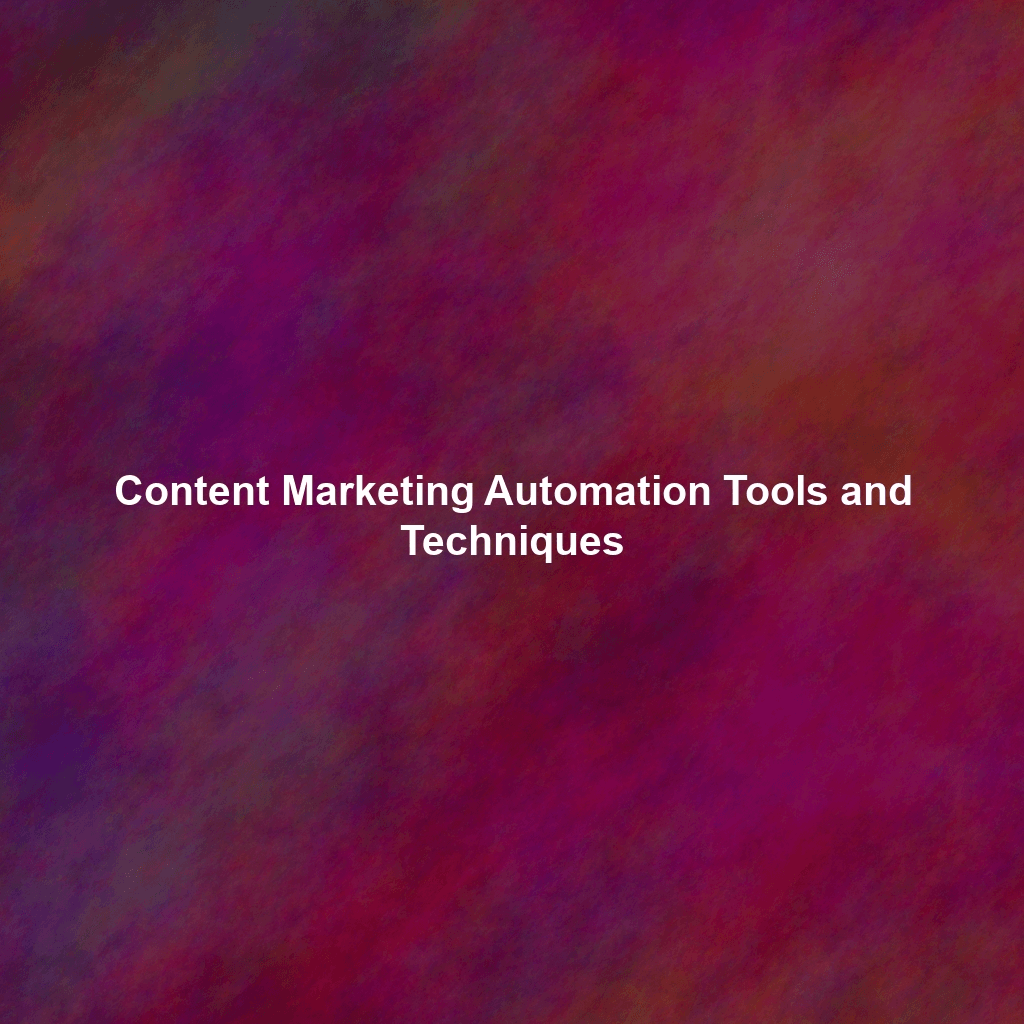Introduction: Level Up Your Content Game with Automation
In today’s fast-paced digital landscape, creating compelling content is only half the battle. Effectively distributing, tracking, and optimizing that content is equally crucial for achieving your marketing goals. That’s where content marketing automation steps in. Content marketing automation leverages software and strategies to streamline repetitive tasks, personalize content delivery, and ultimately, boost your ROI. This article delves deep into the world of content marketing automation tools and techniques, providing actionable insights to transform your content strategy.
Understanding Content Marketing Automation
Content marketing automation isn’t about replacing creativity; it’s about amplifying it. It’s about using technology to handle the logistical aspects of content marketing, freeing you and your team to focus on what you do best: crafting engaging and valuable content. It encompasses various aspects of the content lifecycle, from planning and creation to distribution, promotion, and analysis.
Why Automate Your Content Marketing?
The benefits of content marketing automation are numerous and impactful:
- Increased Efficiency: Automate repetitive tasks like social media posting, email distribution, and data collection, saving valuable time and resources.
- Improved Consistency: Maintain a regular content publishing schedule, ensuring your audience consistently receives fresh and relevant content.
- Enhanced Personalization: Deliver tailored content experiences to different audience segments, increasing engagement and conversion rates.
- Data-Driven Insights: Track content performance metrics to identify what’s working and what’s not, allowing you to optimize your strategy for maximum impact.
- Improved Lead Nurturing: Guide potential customers through the sales funnel with automated email sequences and personalized content offers.
- Scalability: Expand your content marketing efforts without significantly increasing your workload.
Essential Content Marketing Automation Tools
Choosing the right tools is paramount to successful content marketing automation. Here’s a breakdown of some essential tool categories and examples:
1. Content Calendar and Planning Tools
A well-organized content calendar is the backbone of any effective content marketing strategy. These tools help you plan, schedule, and track your content creation process.
- Trello: A versatile project management tool that can be customized to manage your content calendar, assign tasks, and track progress.
- Asana: Similar to Trello, Asana offers robust project management features, including calendar views, task dependencies, and team collaboration tools.
- Monday.com: A visually appealing project management platform that provides a centralized hub for managing content projects and tracking deadlines.
- Google Calendar: A simple and free option for scheduling content deadlines and setting reminders.
2. Social Media Automation Tools
Social media automation tools streamline your social media posting, engagement, and analytics.
- Buffer: A popular social media management platform that allows you to schedule posts across multiple social media channels, analyze performance, and engage with your audience.
- Hootsuite: A comprehensive social media management tool with features like scheduling, monitoring, analytics, and team collaboration.
- Sprout Social: A robust social media management platform that offers advanced analytics, social listening, and customer relationship management (CRM) integrations.
- Later: Primarily focused on Instagram, Later provides features for visual content planning, scheduling, and analytics.
3. Email Marketing Automation Tools
Email marketing automation tools enable you to create personalized email campaigns, nurture leads, and track performance.
- Mailchimp: A widely used email marketing platform with features like email automation, segmentation, and A/B testing.
- ActiveCampaign: A comprehensive marketing automation platform that offers email marketing, CRM, and sales automation features.
- ConvertKit: Designed specifically for creators, ConvertKit provides features for email marketing, landing pages, and automation.
- HubSpot Marketing Hub: A powerful marketing automation platform that integrates with HubSpot’s CRM and sales tools.
4. Content Creation Tools
These tools assist in creating high-quality content, from blog posts and articles to videos and infographics.
- Grammarly: Helps improve your writing by checking for grammar, spelling, and punctuation errors.
- Canva: A user-friendly graphic design tool for creating visually appealing images, infographics, and social media graphics.
- Adobe Creative Cloud (Photoshop, Illustrator, Premiere Pro): Professional-grade tools for creating high-quality images, videos, and designs.
- Headline Analyzer Tools (e.g., CoSchedule Headline Analyzer): Helps you craft compelling headlines that attract attention and improve click-through rates.
5. SEO Tools
SEO tools help you optimize your content for search engines and track your website’s ranking.
- SEMrush: A comprehensive SEO tool that offers keyword research, competitor analysis, site audits, and rank tracking features.
- Ahrefs: Another popular SEO tool that provides valuable insights into backlinks, keyword rankings, and competitor analysis.
- Moz Pro: A suite of SEO tools that includes keyword research, rank tracking, site audits, and link building analysis.
- Google Search Console: A free tool from Google that provides insights into your website’s performance in Google Search.
6. Analytics Tools
Analytics tools are essential for tracking content performance and measuring the success of your content marketing efforts.
- Google Analytics: A free and powerful web analytics platform that provides detailed insights into website traffic, user behavior, and conversion rates.
- Adobe Analytics: A more advanced analytics platform that offers sophisticated data analysis and reporting features.
- Mixpanel: A product analytics platform that helps you understand how users interact with your website or app.
Effective Content Marketing Automation Techniques
Choosing the right tools is only the first step. Here are some effective techniques for leveraging content marketing automation to achieve your goals:
1. Automating Social Media Posting
Schedule your social media posts in advance to maintain a consistent presence and reach your audience at optimal times. Use social media automation tools to schedule posts, track engagement, and respond to comments and messages.
2. Personalizing Email Marketing Campaigns
Segment your email list based on demographics, interests, and behavior. Create personalized email campaigns that deliver targeted content to each segment. Use email marketing automation tools to send automated email sequences based on specific triggers, such as signing up for a newsletter or downloading a resource.
3. Implementing Lead Nurturing Workflows
Create automated email sequences that guide potential customers through the sales funnel. Deliver valuable content and offers at each stage of the funnel to nurture leads and move them closer to conversion.
4. Automating Content Promotion
Use social media automation tools and email marketing to promote your content to a wider audience. Automate the process of sharing your content on social media channels and sending email newsletters to your subscribers.
5. Using Dynamic Content
Personalize website content based on user behavior, demographics, and location. Use dynamic content to display targeted messages, offers, and product recommendations. This can significantly improve user engagement and conversion rates.
6. Setting Up Triggered Emails
Triggered emails are automated emails that are sent based on specific user actions, such as abandoning a shopping cart or signing up for a free trial. These emails can be highly effective for re-engaging users and driving conversions.
7. Monitoring and Analyzing Performance
Use analytics tools to track the performance of your content marketing efforts. Monitor key metrics such as website traffic, engagement rates, lead generation, and conversion rates. Use these insights to optimize your strategy and improve your results.
Best Practices for Content Marketing Automation
To maximize the effectiveness of your content marketing automation efforts, follow these best practices:
- Develop a Clear Content Strategy: Define your target audience, goals, and key messages. Create a content calendar that outlines your content plan for the coming months.
- Choose the Right Tools: Select tools that align with your specific needs and budget. Consider factors such as features, ease of use, and integration with other marketing tools.
- Start Small and Scale Gradually: Don’t try to automate everything at once. Start with a few key areas and gradually expand your automation efforts as you gain experience.
- Personalize Your Content: Use data to personalize your content and deliver targeted messages to your audience.
- Test and Optimize: Continuously test and optimize your automation workflows to improve their performance.
- Monitor Your Results: Track your key metrics and use data to make informed decisions about your content marketing strategy.
- Don’t Over-Automate: Remember that automation should enhance, not replace, human interaction. Ensure that you maintain a personal touch in your communication with your audience.
The Future of Content Marketing Automation
Content marketing automation is constantly evolving, with new technologies and trends emerging all the time. Here are some key trends to watch:
- Artificial Intelligence (AI): AI is being used to automate various aspects of content marketing, such as content creation, personalization, and optimization.
- Machine Learning (ML): ML algorithms are being used to analyze data and identify patterns, helping marketers to better understand their audience and optimize their content.
- Personalization at Scale: Marketers are using automation to deliver highly personalized content experiences to a large audience.
- Voice Search Optimization: As voice search becomes more popular, marketers are optimizing their content for voice search queries.
Conclusion: Embrace Automation for Content Marketing Success
Content marketing automation is a powerful tool for streamlining your content creation, distribution, and analysis processes. By leveraging the right tools and techniques, you can save time, improve consistency, enhance personalization, and ultimately, achieve your content marketing goals. Embrace automation as a key component of your content strategy and unlock the full potential of your content marketing efforts. Start small, experiment with different tools and techniques, and continuously optimize your strategy based on data-driven insights. With a strategic approach and the right tools, you can transform your content marketing and drive significant results for your business.
 Skip to content
Skip to content

